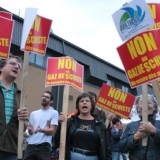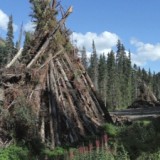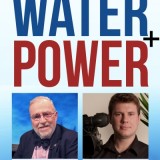The Council of Canadians, along with the Transnational Institute and Corporate Europe Observatory, released a report this week examining the threat that a proposed Canada-EU free trade deal would have on a community’s ability to implement fracking regulations and fracking bans on both sides of the Atlantic.
Canada began negotiations with Europe on the Comprehensive and Economic Trade Agreement (CETA) in 2009 and hope to conclude the agreement by this summer. As Canadian negotiators visit Brussels this week to continue negotiations, the report, The Right to Say No: EU-Canada trade agreement threatens fracking bans, warns the proposed investment protection clauses in the agreement would jeopardise governments’ ability to regulate or ban fracking.
The report draws attention to Lone Pine Resources’ lawsuit against Quebec’s fracking moratorium under the North American Free Trade Agreement (NAFTA). Last fall, Lone Pine Resources, a U.S.-funded energy firm, filed a notice of intent to challenge Quebec’s moratorium on fracking under NAFTA and is asking for $250 million in compensation.
Fracking, or hydraulic fracturing, is a controversial process that uses massive amounts of water mixed with sand and toxic chemicals to blast apart shale rock or coal beds to extract natural gas or oil. Fracking fluid can contaminate drinking water with substances that cause cancer and organ damage, and affect neurological, reproductive and endocrine systems. Safely disposing of fracking wastewater is incredibly difficult. Fracking has also been linked to earthquakes and methane leaks that exacerbate climate change.
“The Right to Say No” looks at how CETA threatens fracking bans, the North American companies already invested in Europe and the state of fracking in both Canada and Europe.
The report is timely as the County of Inverness in Nova Scotia voted Monday to pass a by-law banning fracking within county limits. Cumberland County in Nova Scotia has also passed a motion banning fracking. Burnaby, B.C., Niagara-on-the-Lake, Ontario and a number of Quebec municipalities have passed resolutions calling for the protection of water sources and provincial moratoria. Nova Scotia is not issuing permits until their review on shale gas is complete and Quebec has implemented a moratorium within the province.
With the growing community opposition to fracking, we’ll likely see more by-laws banning fracking in the coming years and it’s crucial that we protect communities’ right to say no to fracking. An appellate panel of the New York Supreme Court recently upheld municipal bans on frackingin the state of New York. So while it’s not a Canadian example, the New York Supreme Court decision is a strong precedent for respecting municipalities right to ban fracking in North America.
The EU and Canada must exclude an investor-to-state dispute settlement process in the agreement, or not only will they be hamerping communities’ democratic right to determine their own environmental laws but Canada and EU countries could also find themselves targets of CETA lawsuits.
The report is available in English and French.
Emma Lui is a water campaigner with the Council of Canadians based in Ottawa. Emma’s work focuses on the Great Lakes, human rights, water privatization and the connection between energy and water.








